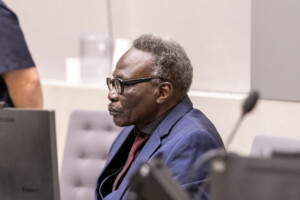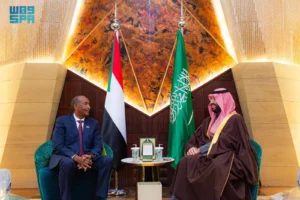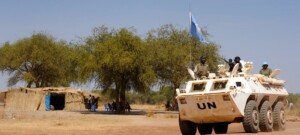Op-ed: ‘Who Should Represent Sudan at the UN?’
Omer Mohamed Siddig presented his credentials as Sudan’s Permanent Representative to the UN on June 18, 2019, at a time when control of Sudan was fully in the hands of the Transitional Military Council (TMC)—and two weeks after the TMC-orchestrated “June 3 Massacre.”
 Sudan ambassador Omer Siddig presents his credentials to the UN Secretary-General António Guterres in June (UN photo)
Sudan ambassador Omer Siddig presents his credentials to the UN Secretary-General António Guterres in June (UN photo)
Omer Mohamed Siddig presented his credentials as Sudan’s Permanent Representative to the UN on June 18, 2019, at a time when control of Sudan was fully in the hands of the Transitional Military Council (TMC)—and two weeks after the TMC-orchestrated “June 3 Massacre.”
Whatever diminishment in the military’s power came with the signing of a Constitutional Charter two months later—an issue that rightly continues to be debated—it would seem deeply unfair to the civilian uprising that brought to Sudan the opportunity for freedom, peace and justice that the country should be represented at the UN by a vestige of the al-Bashir Foreign Ministry, which is exactly what Siddig is (see | https://www.un.org/press/en/2019/bio5219.doc.htm ). Notably, Siddig was appointed First Secretary at the Foreign Ministry in 1989 (the years of the al-Bashir coup) and continued in that post until 1990).
In many of his ambassadorial and other international appointments—including as ambassador to the UK, Germany, and Kenya—Siddig would have been obliged to carry out instructions of the al-Bashir regime, both as the National Islamic Front and subsequently the National Congress Party. This certainly would have included facilitating the work of the National Intelligence and Security Services, which has had legions of informants in these and other countries where Siddig worked. While he is billed as a “career diplomat” in the official UN announcement of last June, there are serious reasons for doubting that his “diplomacy” has served the people of Sudan.
For example, from 2003 to 2004 Siddig served as Director of the Foreign Ministry’s Department of Peace and Humanitarian Affairs. These are the years in which the Darfur genocide escalated massively, as well as a period in which UN officials reported the first serious obstructions of humanitarian aid to civilian populations perceived by the regime—by virtue of their ethnicity—as supporting the Darfur rebels. I find it impossible to believe that Siddig did not at the very least acquiesce in what amounts to a crime against humanity, and very likely did more than merely acquiesce. See "On the Obstruction of Humanitarian Aid," African Studies Review, Volume 54, Number 3 (December 2011), pages 165 – 74 | http://wp.me/p45rOG-I6 .
‘Siddig must be challenged over his recent call for Unamid withdrawal from Darfur, and his false claim that this is warranted by a supposedly complete change throughout Darfur’ – Prof Eric Reeves
At the very least, a thorough inquiry should be made into precisely what Siddig was responsible for during these terrible and critical years. More importantly, Siddig must be challenged over his recent call for UNAMID withdrawal from Darfur, and his false claim that this is warranted by a supposedly “complete” change throughout Darfur (“Darfur today is completely different from the situation that the Security Council started addressing some years ago,” UN Press Release, August 26, 2019). The falsity of Siddig’s claim is sadly echoed by UN and African voices that are pushing for a June 2020 withdrawal of UNAMID, evidently persuaded by Siddig’s further claim that “given the political realities, peacekeeping is not the right option for Darfur.”
Whatever one thinks of “political realities” in Sudan—and hopes for civilian governance and democracy are fragile at best, given the make-up of the Sovereign Council and the growing power of RSF commander Hemeti—this does not change the realities in Darfur of: massive insecurity, including murder, rape, abduction, and village and farm destruction; violent displacement (including more than 300,000 Darfuri refugees in eastern Chad, too fearful to return to Sudan); insufficient humanitarian relief, with a number of IDP camps desperately under-served; and the critical need for land restitution for farmers who have lost their farms during the genocide. None of these “realities” can be addressed in a region in which the Rapid Support Forces/janjaweed remain the dominant power, uncontrolled since the beginning of conflict in 2003 and accelerating with the creation of the RSF in 2013.
Whether we call it “peacekeeping” or simply the provision of security for defenseless civilians and relentlessly threatened international humanitarian efforts matters not: the need is urgent, and withdrawing UNAMID—whatever its gross failings—is not the answer. Rather, the UN should seriously debate how to protect civilians who continue to be attacked and who will not be protected by the Sudan Armed Forces, represented on the Sovereign Council by several generals, including the head of the Sovereign Council, General al-Burhan. Given this reality, peace and security in Darfur—as well as South Kordofan and Blue Nile—must be benchmark criteria for the international community in its assessment of the transitional government.
Instead, we catch a glimpse of Siddig’s sense of obligation to the military power in Khartoum with his absurd claim that there should be “an end to the restrictions of movement of arms and troops [which are] needed to maintain law and order and to prevent a relapse into violence.” The arms embargo imposed on Darfur by the UN Security Council in March 2005 was never observed by the al-Bashir regime (or the TMC), although it was deeply resented by the military. That Siddig is claiming that more arms should be going into Darfur is preposterous, as is his speaking of a “relapse into violence.” Again, extreme violence is ongoing in Darfur and a comprehensive survey demonstrating as much would comprise, among other reports, the following monographs:
• “Continuing Mass Rape of Girls in Darfur: The most heinous crime generates no international outrage,” January 2016. Eric Reeves, author; Maya Baca, research and editing | http://wp.me/p45rOG-1QG
[Arabic translation of this report | http://wp.me/p45rOG-1Rr ]
• “UNAMID Withdrawal and International Abandonment: Violence in Darfur 2017 – 2019, a statistical analysis,” May 20, 2019. Eric Reeves, author; Maya Baca, research, data collection, and editing | https://wp.me/p45rOG-2qm
• "'Changing the Demography': Violent Expropriation and Destruction of Farmlands in Darfur, November 2014 – November 2015,"December 1, 2015. Eric Reeves, author; Maya Baca, research and editing | http://wp.me/p45rOG-1P4
Omer Mohamed Siddig cannot legitimately represent the people of Sudan. Prime Minister Hamdok and his Foreign Minister should make the appointment of Sudan’s UN Ambassador, not the Transitional Military Council of the “June 3 Massacre.”
[For more on Siddig’s recent comments, see Radio Dabanga, August 30, 2019 ]
This article was originally published on sudanreeves.org
Disclaimer: The views and opinions expressed in this article are those of the contributing author or media and do not necessarily reflect the position of Radio Dabanga.
 Prof Eric Reeves is a Senior Fellow at Harvard University’s François-Xavier Bagnoud Center for Health and Human Rights. He has spent the past 20+ years working virtually full-time as a Sudan researcher and analyst, publishing extensively both in the US and internationally. He has testified several times before the US Congress, has lectured widely in academic settings, and has served as a consultant to a number of human rights and humanitarian organisations operating in Sudan. Working independently, he has written on all aspects of Sudan’s recent history. His book about Darfur (A Long Day’s Dying: Critical Moments in the Darfur Genocide) was published in May 2007. He has recently published Compromising with Evil: An archival history of greater Sudan, 2007 — 2012 (available at no cost as an eBook)
Prof Eric Reeves is a Senior Fellow at Harvard University’s François-Xavier Bagnoud Center for Health and Human Rights. He has spent the past 20+ years working virtually full-time as a Sudan researcher and analyst, publishing extensively both in the US and internationally. He has testified several times before the US Congress, has lectured widely in academic settings, and has served as a consultant to a number of human rights and humanitarian organisations operating in Sudan. Working independently, he has written on all aspects of Sudan’s recent history. His book about Darfur (A Long Day’s Dying: Critical Moments in the Darfur Genocide) was published in May 2007. He has recently published Compromising with Evil: An archival history of greater Sudan, 2007 — 2012 (available at no cost as an eBook)
Radio Dabanga’s editorial independence means that we can continue to provide factual updates about political developments to Sudanese and international actors, educate people about how to avoid outbreaks of infectious diseases, and provide a window to the world for those in all corners of Sudan. Support Radio Dabanga for as little as €2.50, the equivalent of a cup of coffee.












 and then
and then